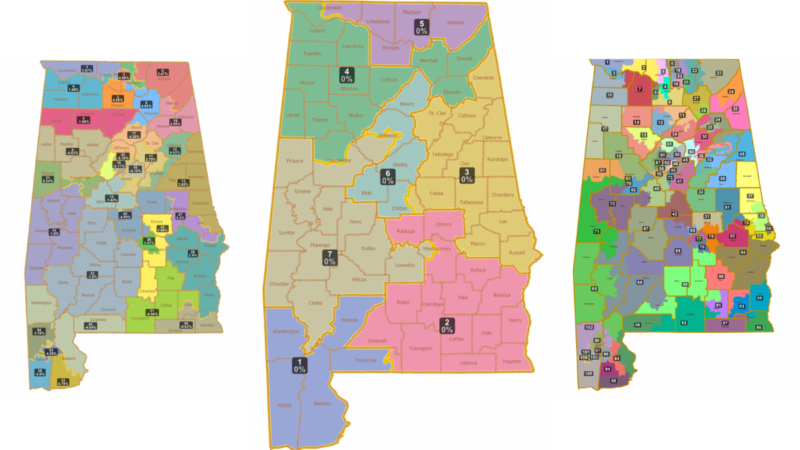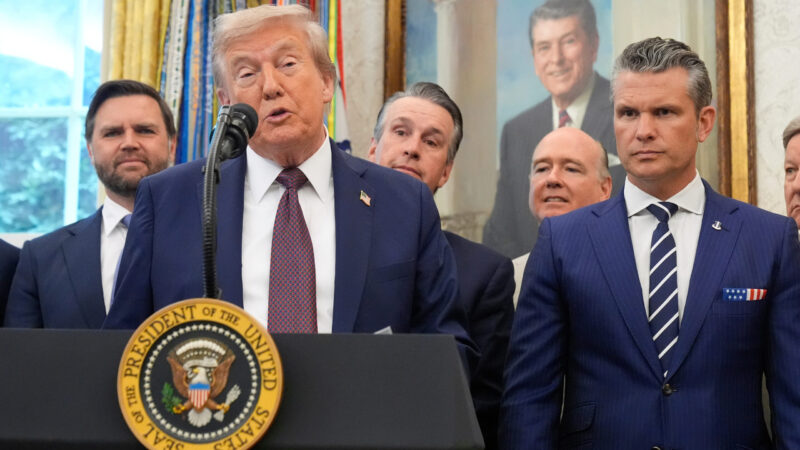Lawsuits challenge new legislative, congressional lines
These redistricting maps were finalized during the 2021 special legislative session. The state Senate map is far left, the congressional district map is in the center, and the state House map is on the right.
MONTGOMERY, Ala. (AP) — A pair of lawsuits announced Monday are challenging Alabama’s new congressional and legislative districts as racially gerrymandered to diminish the voting power of Black and minority voters.
The lawsuits argue the new districts unlawfully pack Black voters into a small number of districts — limiting their ability to influence elections outside those districts — and break up minority communities elsewhere in the state. The cases were brought on behalf of Greater Birmingham Ministries, Alabama State Conference of the NAACP, and several individuals who are being represented by advocacy groups.
“What Alabama is attempting to do here is not only wrong and undemocratic. It’s also a clear extension of a sadly consistent pattern in Alabama history in which lawmakers and powerbrokers use cynical measures in an attempt to marginalize Black and brown communities,” said Deuel Ross, Senior Counsel for NAACP Legal Defense and Educational Fund, Inc.
The lawsuits are asking federal judges to block the maps from being used in the 2022 elections.
Alabama lawmakers approved new congressional, legislative and school board districts earlier this month. Republican legislative leaders have expressed confidence the maps will survive a court challenge. The lawsuits announced Monday join at least two others challenging the newly drawn congressional districts.
Republican Rep. Chris Pringle, the co-chair of the legislative redistricting committee, said Monday evening that he had just heard of the lawsuits and could not comment.
The new districts are expected to maintain the lopsided Republican majority in the Alabama Legislature and the congressional delegation. The seven-member congressional delegation consists of six Republicans elected from heavily white districts and one Democrat elected from the only majority-Black district. About 26% of Alabama’s population is Black, and some lawmakers argued the state should have a second congressional district with a significant African-American population.
During the recent special session, Republicans voted down Democratic efforts to create one swing congressional district centered in Birmingham that would be competitive between Republicans and Democrats.
“The State of Alabama carries a sordid record of using racial discrimination to maintain the political power of its white citizens,” one of the new lawsuits stated. “While Alabama’s elected officials have made important changes over the past fifty years — mostly as a result of court orders or U.S. Department of Justice intervention — Defendants continue to run afoul of the law when it comes to redistricting.”
The GOP-controlled Legislature in 2017 had to redraw legislative maps under court order to fix racial gerrymandering in 12 districts. The ruling came after Black lawmakers filed a similar lawsuit challenging the maps as “stacking and packing” Black voters into designated districts to make neighboring districts whiter and more likely to elect conservative Republicans.
Editor’s Note: For 25 years, WBHM served as a food collection site during the holiday season for Greater Birmingham Ministries.
Auburn fires coach Hugh Freeze following 12th loss in his last 15 SEC games
The 56-year-old Freeze failed to fix Auburn’s offensive issues in three years on the Plains, scoring 24 or fewer points in 17 of his 22 league games. He also ended up on the wrong end of too many close matchups, including twice this season thanks partly to questionable calls.
In a ‘disheartening’ era, the nation’s former top mining regulator speaks out
Joe Pizarchik, who led the federal Office of Surface Mining Reclamation and Enforcement from 2009 to 2017, says Alabama’s move in the wake of a fatal 2024 home explosion increases risks to residents living atop “gassy” coal mines.
‘It’s like feeling the arms of your creator just wrapped around you’: a visit to a special healing Shabbat
Members of Temple Emanu-El in Birmingham gathered recently for their traditional Friday Shabbat service. But this particular service was different, as could be seen by all the people dressed in their finest pink.
Space Command is coming to Huntsville. What might that mean for first-time homebuyers
While Huntsville has been a more affordable market than other growing cities, what’s it been like for those looking for their first home?
Colorado says relocation of Space Command to Alabama is ‘punishment’ for mail-in voting
The litigation announced by Colorado Attorney General Phil Weiser asks a federal judge to block the move as unconstitutional.
Breaking down Alabama’s CHOOSE Act
It’s been a year since Alabama legislators passed the CHOOSE Act allowing families to apply for state funds to use towards homeschool expenses and tuition for participating private schools. The Alabama Daily News’ education reporter Trisha Powell Crain has been diving into how the funds are being used. WBHM’s Andrew Gelderman sat down with her to talk about what we’re seeing so far.









